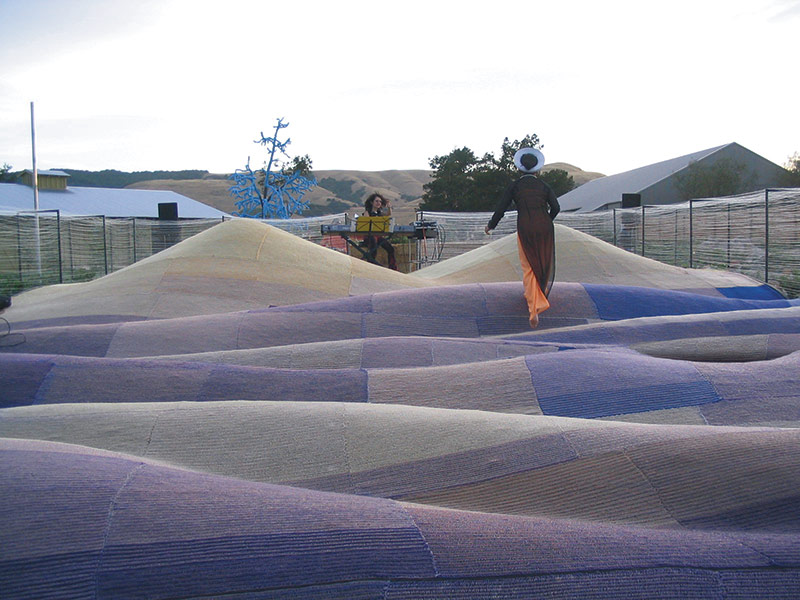
The Architectural League’s 31st annual Emerging Voices Award brings a focus to creative practices that will influence the future direction of architecture. Each of the eight firms will deliver a lecture this month in Manhattan. The next lecture takes place on Thursday, March 28 at 7:00 p.m. when Cao | Perrot Studio and Productora will present their work.
Cao | Perrot Studio
Los Angeles, Paris
You may have experienced the landscapes of Andy Cao and Xavier Perrot in your dreams. The Los Angeles- and Paris-based Cao | Perrot Studio crafts a “magical realism” of handmade experience that bridges cultural memories and fully engages with the senses. “We’re not so much designers or landscape architects,” Cao said. “We’re more like landscape artists.”
The studio’s work emphasizes a handcrafted quality that “is covered in fingerprints” drawing from Cao and Perrot’s backgrounds growing up on farms in Vietnam and Brittany, France, respectively.
“Everything is low-tech and primitive. It looks almost like there is no design, like it’s always been there,” said Cao. “But the process is very deliberate and very time-consuming.”
|
Glass Garden, Los Angeles, CA.
Stephen Jerrome
|
||
Cao first met Xavier Perrot, then a student, while working on an installation in France, where the duo “instantly clicked.” Later, in 2001, Cao was awarded the Rome Prize and asked Perrot to collaborate with him for a year in Rome. “I liked his sensibility,” Cao said. “We really connected on a deeper level because we had a year to work together in Rome.” The Cao | Perrot Studio was formally organized five years later, in 2006.
After studying landscape architecture at the California State Polytechnic University in Pomona, Cao began practicing as a glass artist in his own backyard. “I started with one bucket of glass and ended up with 45 tons of glass,” he said. “It ended up launching my career and really helped me discover who I am.” Soon, commissions began coming in from around the world.
|
Jardin Des Hesperides, Metis Festival of Gardens, quebec (top). Lantern frame (left). Lantern covered with saffron-dyed cotton fabric (center, right).
Louise Tanguay
|
||||
One of them, the Lullaby Garden, built in California in 2004 at the Cornerstone Gardens Festival, is an undulating sea of handmade textiles surrounded by a neatly woven web of fishing line that catches the ephemeral quality of changing light. Cao spent three months in Vietnam working with local artisans to fabricate the landscape, going door to door to find 60 artisans to knit each of the 200 nylon textiles.
“Can we create a garden that’s not just about planting but also about material and association?” Cao asked. “What happens if you can walk on those rolling waves? It alters your perception of scale. It makes you feel like a giant and connects you to the rolling hills of Sonoma in the distance.” Over time, Cao said, the landscape is meant to fade and deteriorate. “Instead of holding onto things forever, let’s see how things fall apart.”
|
Red Bowl, Beauvais, France.
Courtesy Cao | Perrot Studio
|
||
At the Jardin Des Hesperides, part of the 2006 Metis Festival of Gardens in Quebec, Canada, Cao | Perrot positioned an inhabitable saffron-tinted lantern floating in a pool surrounded by orange trees, irises, and Vetiver grass.
A meandering series of burnt cedar trunks step through the forest clearing, as a custom-made fragrance emanating from the lantern draws visitors in. “Our sites are often secluded, so you stumble upon them,” Cao said. “It’s a little bit like stepping into a dream. When you wake up, all you have is a memory.”
More recently, Cao | Perrot completed the Red Bowl installation at the Saint Lazare Leprosarum, a former leper colony in France, where themes of cleansing and purification were explored. An array of 5,000 red marbles sit atop steel poles to express the bowl’s form bisected by a path.
Cao said the studio’s work has no narrative that guides visitors through. “We want to create an environment and let people experience it in their own way,” he said “The minute you tell the story, the mystery goes away. We deliberately remove hierarchy; there’s no beginning or end.”